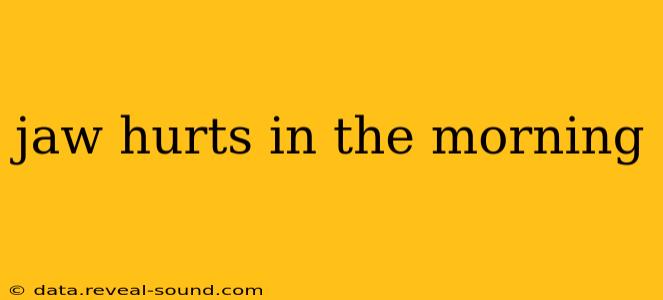Waking up with jaw pain can be incredibly frustrating and disruptive to your day. This common ailment can stem from a variety of causes, ranging from simple muscle tension to more serious underlying conditions. Understanding the potential reasons behind your morning jaw pain is crucial for finding effective relief and preventing future occurrences. This comprehensive guide will explore the common causes, offer practical remedies, and advise when professional medical attention is necessary.
What Causes Jaw Pain in the Morning?
Morning jaw pain often arises from activities or conditions that exacerbate the temporomandibular joint (TMJ), the hinge connecting your jaw to your skull. Several factors can contribute:
-
Teeth Grinding (Bruxism): This unconscious habit, often occurring during sleep, puts immense pressure on the jaw muscles and TMJ, leading to morning soreness and stiffness. Stress, anxiety, and even sleep apnea can exacerbate bruxism.
-
Temporomandibular Joint Disorder (TMJ): TMJ disorders encompass a range of conditions affecting the TMJ and surrounding muscles. Symptoms can include jaw pain, clicking or popping sounds in the jaw, headaches, and earaches, often worsened upon waking.
-
Muscle Tension: Stress, poor posture, or sleeping in awkward positions can strain the jaw muscles, resulting in morning stiffness and pain.
-
Arthritis: Conditions like osteoarthritis or rheumatoid arthritis can inflame the TMJ, causing pain and limited jaw movement, particularly noticeable in the mornings.
-
Dental Issues: Problems like impacted wisdom teeth, poorly fitting dental work (crowns, bridges, dentures), or an improperly aligned bite can contribute to jaw pain.
-
Sleep Position: Sleeping on your stomach or side can put extra pressure on your jaw and neck, resulting in morning discomfort.
What to Do if Your Jaw Hurts in the Morning
Addressing morning jaw pain requires a multi-pronged approach focusing on both immediate relief and long-term prevention:
-
Gentle Stretching and Exercises: Simple jaw stretches, such as opening and closing your mouth slowly, or gently moving your jaw from side to side, can help alleviate morning stiffness. Consult a physical therapist for guidance on specific exercises.
-
Over-the-Counter Pain Relief: Nonsteroidal anti-inflammatory drugs (NSAIDs) like ibuprofen or naproxen can help reduce pain and inflammation. Always follow the recommended dosage.
-
Heat or Cold Packs: Applying a warm compress or ice pack to your jaw can provide temporary relief. Experiment with both to see which works best for you. Remember to wrap the pack in a thin cloth to avoid direct skin contact.
-
Stress Management Techniques: If stress contributes to your jaw pain, incorporating stress-reducing techniques like yoga, meditation, or deep breathing exercises into your daily routine can be beneficial.
How Can I Prevent Jaw Pain in the Morning?
Preventing morning jaw pain often involves addressing underlying causes and adopting healthy habits:
-
Identify and Treat Bruxism: If you suspect you grind your teeth, discuss it with your dentist. They might recommend a mouthguard to protect your teeth and jaw during sleep.
-
Improve Sleep Posture: Try sleeping on your back with a supportive pillow to minimize pressure on your jaw.
-
Maintain Good Oral Hygiene: Regular brushing and flossing help prevent dental issues that could contribute to jaw pain.
-
Manage Stress Levels: Employ stress-reduction techniques to minimize muscle tension.
-
Maintain a Healthy Diet: A balanced diet rich in nutrients helps support overall health, including the health of your jaw muscles and joints.
When Should I See a Doctor About My Morning Jaw Pain?
While many cases of morning jaw pain resolve with home remedies, it's crucial to seek professional medical attention if:
- The pain is severe or persistent.
- You experience difficulty opening or closing your mouth.
- You have swelling or redness in your jaw.
- You experience jaw locking.
- The pain is accompanied by fever or other systemic symptoms.
- Home remedies provide no relief.
Your doctor or dentist can accurately diagnose the underlying cause of your jaw pain and recommend appropriate treatment options. Delaying treatment could lead to more severe complications.
Is Jaw Pain in the Morning a Sign of TMJ?
While morning jaw pain can be a symptom of TMJ, it's not the only cause. TMJ disorders often present with additional symptoms like clicking or popping in the jaw, headaches, and earaches. If you suspect you have TMJ, a proper diagnosis from a dentist or specialist is essential.
Can Stress Cause Jaw Pain in the Morning?
Yes, stress can significantly contribute to morning jaw pain. Stress leads to increased muscle tension, which can manifest as jaw clenching or grinding, especially during sleep. Managing stress through relaxation techniques is crucial in mitigating this type of pain.
This information is for general knowledge and does not constitute medical advice. Always consult with a healthcare professional for any health concerns.
